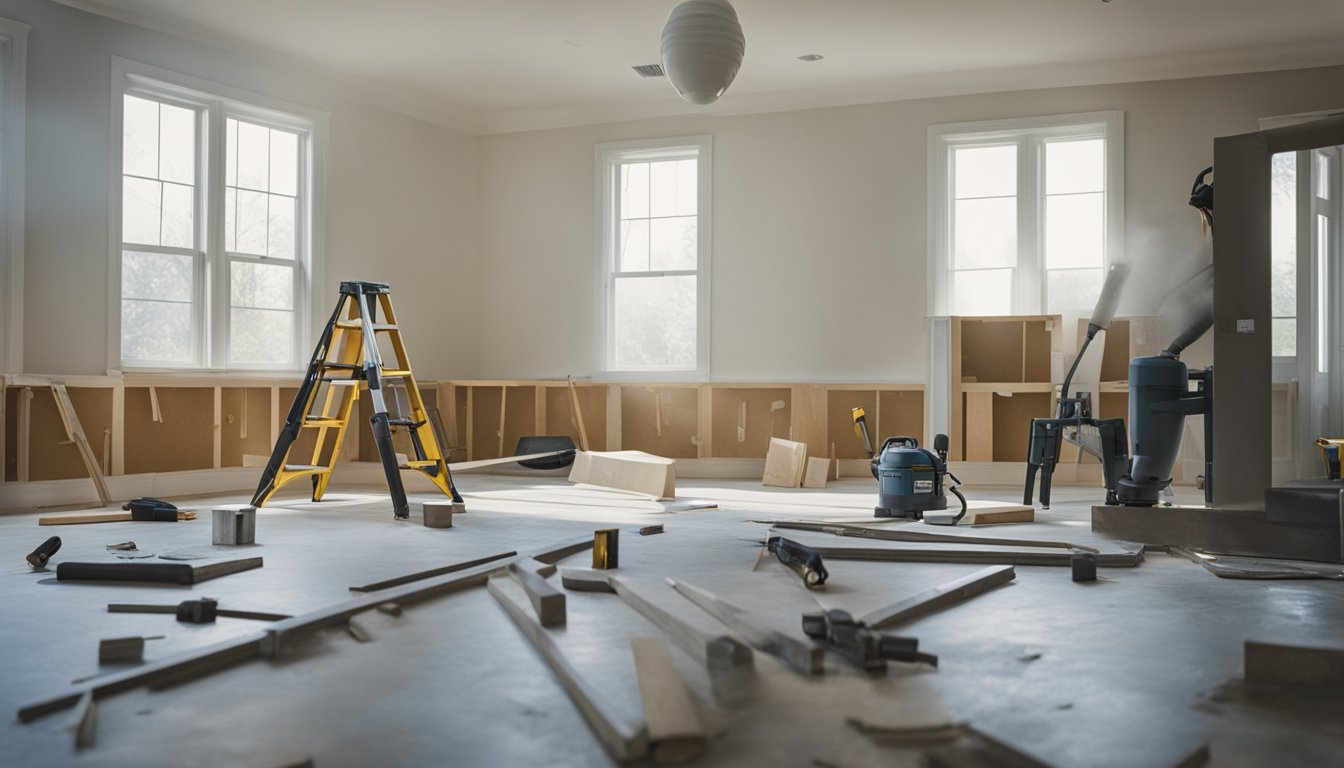Late updated: 29 Jun 2024 11:06
Written by: Daniel Harper
Essential Guide To Modern Home Renovation Techniques: Expert Tips for Success
In today's fast-paced world, embracing modern home renovation techniques is essential for creating a functional and stylish living space. We understand that starting such a project might seem daunting, but our essential guide is here to simplify the process for you. By following our expert advice, you can transform your home with efficiency and elegance.

It's crucial to establish a clear vision and thorough plan before diving into any renovation. This ensures that every step aligns with your desired outcomes, preventing costly mistakes and delays. Our guide will walk you through each phase, from initial planning and design to execution and project management, ensuring a smooth and successful renovation.
Whether you're a seasoned DIY enthusiast or a beginner, our comprehensive insights and practical tips will cater to all your needs. We'll also address some frequently asked questions to help you navigate common challenges. Let's embark on this journey together and bring your home renovation dreams to life.
Key Takeaways
- A well-defined vision and plan are critical for a successful home renovation.
- Proper planning and project management are essential to avoid mistakes.
- Our guide offers practical tips and answers to common renovation questions.
Planning and Designing Your Home Renovation
Proper planning and design are crucial to execute a successful home renovation. We need to develop a clear and detailed plan, choose a design that reflects our personal style, establish a realistic budget and timeline, and ensure we navigate all legal requirements efficiently.
Developing a Clear Renovation Plan
To start, we must define our goals and objectives. Determine whether the renovation aims to improve functionality, increase the property’s value, or simply update its aesthetics. Identifying the project's scope, such as the rooms or areas that will be renovated, helps in creating a structured outline.
Next steps:
- Assess Existing Conditions: Conduct a detailed inspection of the areas involved.
- List Required Updates: From larger structural changes to smaller enhancements like updating countertops or backsplashes.
- Research Inspiration: Look at magazines, websites, and showrooms for ideas.
Lastly, create a detailed room-by-room plan to ensure nothing is overlooked.
Choosing a Design That Complements Your Style
The design should mirror our personal style, ensuring a cohesive and appealing look. Start by selecting a colour palette that suits the atmosphere we desire.
Elements to consider:
- Materials: Choose high-quality and durable materials for longevity.
- Furniture and Fixtures: Select pieces that integrate well with the overall design.
- Accents and Finishes: Decide on details such as backsplashes and countertops for added style.
We can also create a mood board to visualise how different elements work together. Consulting with design professionals can offer invaluable insights tailored to our vision.
Creating a Realistic Budget and Timeline
Setting a practical budget is essential to avoid financial strain during the project. First, identify the cost of materials, labour, and additional expenses like permits and unexpected issues.
Important steps in budgeting:
- Detailed Estimates: Get quotes from contractors and suppliers.
- Emergency Fund: Allocate a contingency of at least 10% of the total budget for unforeseen costs.
- Prioritise: Determine which parts of the renovation are essential versus optional.
Parallel to budgeting, establish a timeline with realistic milestones. Define start and end dates, and set intermediary checkpoints to keep the project on track.
Navigating Legal Requirements and Permits
Renovations often require compliance with local regulations and acquiring necessary permits. Research the local building codes and planning permissions needed for our specific project.
Steps to follow:
- Consult Local Authorities: Ensure we understand the regulations and deadlines.
- Documentation: Prepare detailed plans and applications for submission.
- Professional Assistance: Hire a professional if needed to handle permits and ensure compliance.
Properly addressing these legal aspects prevents delays and ensures that the renovation meets all legal standards, safeguarding the investment and the integrity of the home.
Execution and Project Management

Executing a modern home renovation requires meticulous planning and strong project management skills. Focusing on contractor selection, communication, and managing delays ensures a successful and timely project completion.
Selecting and Working with Contractors
Choosing the right contractor is crucial. We need to vet potential contractors thoroughly. Asking for references and previous work samples is essential. Make sure they are licensed and insured to adhere to local regulations and safety standards.
Once we hire a contractor, a detailed contract must be in place. This document should outline the scope of work, timeline, budget, and payment schedules. Establishing clear expectations prevents misunderstandings.
Regular meetings with the contractor can help us ensure the project is on track. We should also be prepared to address any issues that arise promptly to avoid delays.
Effective Communication and Oversight
Effective communication is key to a smooth renovation process. We must maintain open lines of communication with all stakeholders, including the contractors, designers, and possibly our neighbours.
Setting clear goals at the outset can guide decisions and help keep everyone aligned. Using project management software can streamline updates and document exchanges. Regularly scheduled meetings and updates via email or messaging apps can keep us informed of progress and any arising issues.
Additionally, periodic site visits are essential. They allow us to oversee the work being done, verify that it meets our expectations, and address any concerns immediately.
Managing Delays and Ensuring Quality
Delays are sometimes unavoidable, but proper planning can minimise their impact. We need to build a buffer into our timeline to accommodate unforeseen challenges. Keeping a detailed schedule and monitoring progress closely helps us stay on track.
If we encounter delays, it's important to communicate transparently with our contractor and identify the root cause. Finding a resolution quickly can prevent escalation.
Ensuring quality is paramount. We should not hesitate to request corrections if the work does not meet the agreed-upon standards. Conducting regular inspections at key milestones ensures each phase meets our quality benchmarks before moving to the next stage.
Contractors should be held accountable for maintaining high standards throughout the project. This vigilance ensures our renovation is not only timely but also meets the desired specifications.
Frequently Asked Questions

In this section, we address the most pressing questions homeowners have when considering a home renovation. From planning to execution, these FAQs provide practical advice and essential information.
What are the initial steps to planning a home renovation?
Initial planning steps include setting a realistic budget and determining the scope of work. Identifying splurge-worthy items early on helps allocate resources effectively. Essential tools such as hammers, screwdrivers, drills, and tape measures are crucial for successful DIY projects.
What is the recommended sequence for renovating different parts of a house?
Typically, start with structural improvements such as roofing and foundation repairs. Follow with systems like plumbing and electrical updates. Finish with interior updates such as drywall, painting, and flooring. Prioritising this sequence ensures safety and efficiency.
How can a beginner effectively manage a comprehensive home renovation project?
A beginner should seek guidance from experienced partners or consultants. Learning from those who have undergone similar projects helps avoid costly mistakes. Using checklists and detailed plans aids in managing tasks and staying on track.
Could you provide a checklist for a home renovation process?
- Set a Budget: Include a 10% buffer for unexpected costs.
- Plan the Scope of Work: Identify all tasks and allocate resources.
- Acquire Essential Tools: Ensure all necessary tools are available.
- Hire Professionals: For specialised tasks beyond DIY skills.
- Schedule Inspections: Ensure compliance with building codes.
What are the critical stages involved in renovating a property?
Key stages include initial planning, budgeting, securing permits, structural repairs, system updates, and finishing improvements. Each stage requires careful planning and execution for a successful renovation.
When renovating, which elements of a home should receive priority in repairs?
Prioritise structural integrity, electrical systems, and plumbing first. These fundamental elements ensure safety and functionality. After addressing these, focus on insulation, windows, and roofing to improve energy efficiency and protect the property.
